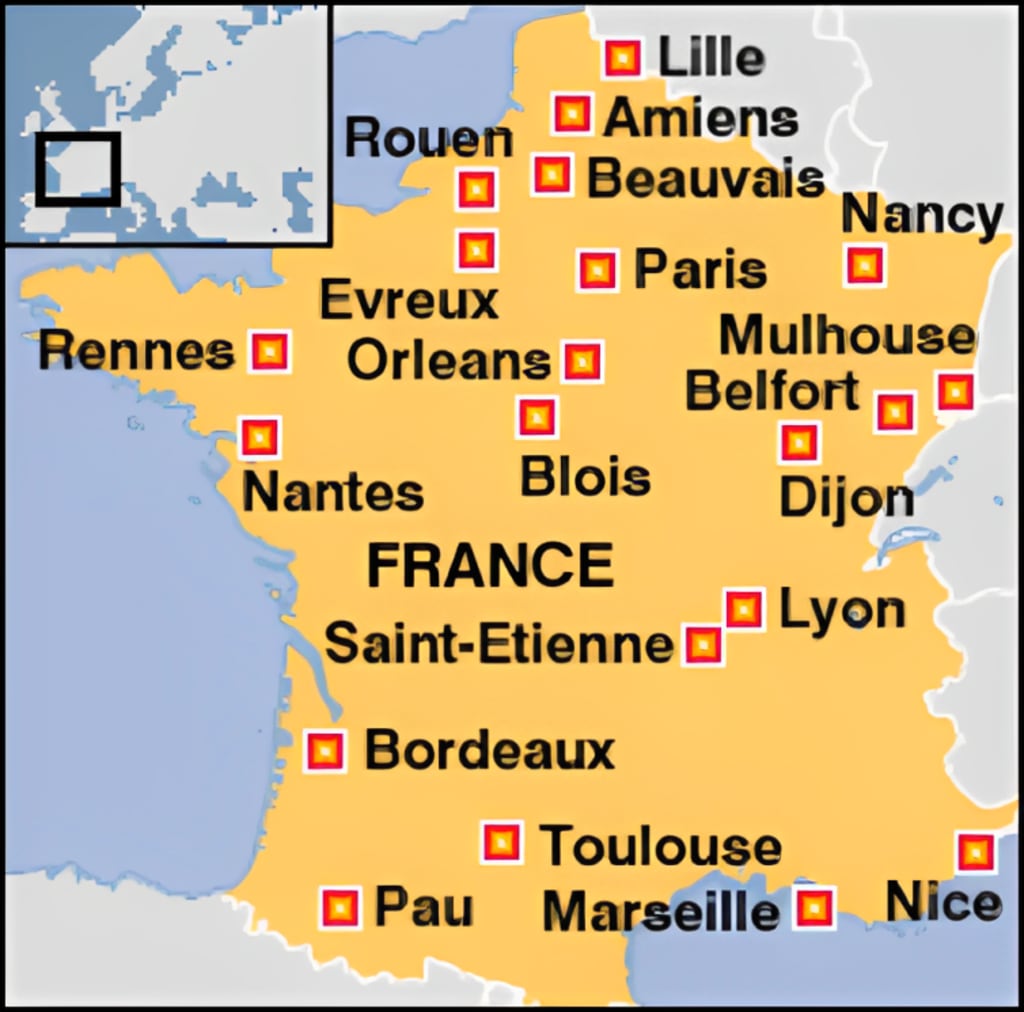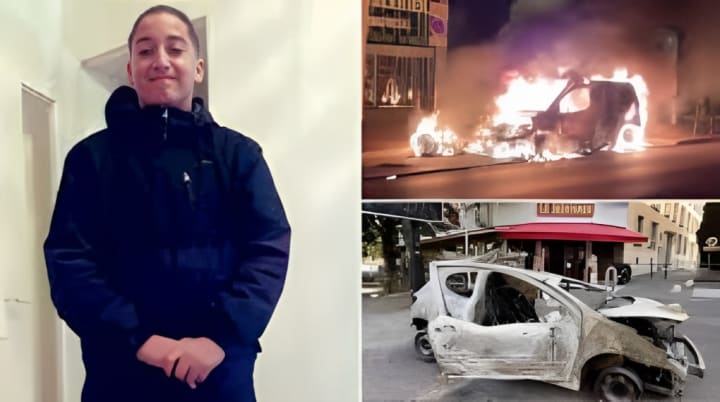Unraveling the Root Causes and Impacts of the French Riots

In recent times, France has witnessed a recurrence of social unrest, with riots following a familiar pattern that has persisted for decades. These riots often stem from incidents where young individuals from working-class neighborhoods are killed or injured by the police, leading to a cascade of violence and looting in the affected areas . However, delving deeper into the heart of the matter reveals a web of underlying causes contributing to this unrest.
The Reason Riots Started

The most recent wave of riots in France was triggered by the tragic shooting of 17-year-old Nahel Merzouk during a routine traffic stop in Nanterre, Paris. Nahel, of North African descent, became the latest victim in a series of incidents that have fueled long-standing grievances against police violence and systemic racism. The unsettling truth is that Nahel's case is not an isolated incident; it follows a distressing trend, with three similar killings in 2021 and two in 2020, the majority of victims since 2017 being Black or of Arab origin.
The initial clashes erupted in and around Nanterre, where Nahel lost his life, and soon the unrest rippled across the nation, engulfing various cities throughout the week. At the heart of these riots lie marginalized youths from working-class neighborhoods, expressing their pent-up anger and frustration through acts of violence and looting. Their actions shed light on the profound divisions and tensions embedded within French society, emanating from issues of social and economic inequality, discrimination, and the pervasive sense of marginalization experienced by certain communities, notably in the banlieues (suburbs).
Root Causes of the French Riots
The heart of the matter lies in social and economic inequality, discrimination, and a pervasive sense of marginalization among certain communities, notably those dwelling in the banlieues (suburbs) . High unemployment rates exacerbate these tensions, amplifying the discontent simmering beneath the surface .
Key Players in the Riots
The riots predominantly involve young people hailing from working-class neighborhoods, who vent their anger and frustration through acts of violence and looting. The police also play a crucial role, as their actions or perceived misconduct can trigger the initial unrest.
Impact on French Society and Economy
The ongoing riots in France have left an indelible mark on the country's economy, with businesses bearing the brunt of the violence and destruction. The toll has been staggering, with the French business association, MEDEF, estimating the damage to exceed €1 billion ($1.1 billion). Over 400 shops across the nation have fallen prey to the rioting, with most being subjected to looting and a devastating 10 percent reduced to ruins. The repercussions have rippled beyond the immediate unrest, impacting the thriving tourism industry - a significant contributor to the French economy.
The plight of businesses grappling with losses has not gone unnoticed, prompting the French government to consider measures to support the most affected. Proposals include potentially canceling or deferring social security contributions and taxes and extending the window for businesses to make insurance claims from five to 30 days. While such initiatives seek to alleviate the immediate strain, some experts assert that the riots' true impact on the French economy may be more nuanced - a shadow cast over the country's image and reputation.
Government Response and Criticisms
The French government has been swift in its response to the ongoing riots, deploying a considerable number of police officers to regain control amidst the unrest. Officials have expressed their concern and offered condolences to the victims, but criticism looms large, questioning the efficacy of addressing the underlying issues in the affected neighborhoods.
Recognizing the significant economic toll on businesses, the government has taken measures to support those most impacted by the riots. Initiatives include potentially canceling or deferring social security contributions and taxes, providing a much-needed lifeline for struggling enterprises. Businesses have also been granted an extended timeframe of 30 days, rather than the initial five, to make insurance claims - a crucial step towards easing their burdens.
Nevertheless, amidst the turbulence, voices of discontent resonate, asserting that the government's actions remain inadequate in tackling the root causes of the unrest. As store windows shatter and looting becomes a nightly spectacle, French government spokesman Olivier Veran has asserted that there is no political message in these acts, and he refrains from referring to them as a movement.
To protect its image and reassure both tourists and foreign investors, the French government seeks to convey a message of stability, urging them not to be deterred by the riots. However, the key to restoring confidence lies in confronting the deep-seated issues that underpin the unrest - social and economic inequality, discrimination, and a sense of alienation among certain communities.
Media Coverage and International Attention
The riots unfolding in France have become a subject of intense media scrutiny, both within the nation's borders and on the international stage. Media outlets have provided extensive coverage, shedding light on the violence, destruction, and arrests that have marred the streets. Beyond the surface chaos, they have delved into the underlying social and economic issues that fuel the unrest, unearthing the roots of discontent.
In the pursuit of reporting the truth, journalists have faced physical threats while covering the unfolding events. This unfortunate reality highlights the gravity of the situation and the challenges reporters encounter in their duty to inform the public.
The media's role has been critical, as in the past, French broadcasters faced criticism for their insufficient coverage of civil unrest within the country. However, the current situation has sparked a resurgence in robust reporting, illuminating the complexities that lie beneath the surface of the riots.
Beyond French borders, the riots have garnered attention and reactions from other countries and international organizations. While some nations express concern and offer support, others seize the opportunity to critique French policies and social issues. Notably, Algerian journalist Maher Mezahi contributed a poignant article to the BBC, highlighting the everyday discrimination fueling the unrest, offering a unique perspective on the situation.
In response to the escalating situation, French President Emmanuel Macron has called upon social media platforms to play a role in quelling the demonstrations. By requesting TikTok and Snapchat to withdraw "most sensitive content" and identify users inciting disorder or violence, the government seeks to curtail the propagation of unrest through social networks. This underscores the evolving landscape of information dissemination and its potential influence on the unfolding events.
As the spotlight continues to focus on France, it is imperative to recognize the media's critical role in illuminating the complexities of the situation. In presenting a comprehensive and nuanced portrayal of the unrest, journalists play a crucial role in fostering understanding and empathy.
Conclusion: Forging a United Path Forward
As France stands at a crossroads, grappling with the aftermath of the recent riots, it has an opportunity to chart a united and inclusive path forward. The riots have laid bare the deep-rooted social and economic inequalities, discrimination, and marginalization that have plagued certain communities for far too long. The key to moving forward lies in acknowledging these pressing issues and crafting comprehensive solutions that address the root causes.
The French government, in its efforts to control the unrest and support businesses affected by the riots, must go beyond immediate measures. It is crucial to delve into the heart of societal grievances and implement lasting reforms that empower communities. Investing in education, job opportunities, and social integration can be the foundation upon which a more harmonious and equitable society is built.
Moreover, the media's role in reporting responsibly and engaging in in-depth coverage remains pivotal. By spotlighting the complexities of the situation and fostering a deeper understanding, the media can drive constructive dialogue that transcends borders and unites people in pursuit of common goals.
As France moves forward, embracing dialogue and empathy are critical. It is essential to listen to the voices of those who have long felt marginalized and excluded. Engaging in open conversations that address systemic issues head-on can be a catalyst for societal transformation.
Collectively, the nation can strive towards unity and progress, bridging divides and cultivating an environment of trust and respect. Embracing diversity as a strength, France can celebrate its cultural richness and heritage, fostering an inclusive identity that unites rather than divides.
The French country's journey towards a brighter future requires collaboration and shared vision. Government, citizens, communities, and the media must work together to shape a society founded on the principles of justice, equality, and compassion.
With resolve and determination, France can rise above the challenges that lie ahead. By navigating these turbulent waters with unwavering commitment, the nation can emerge stronger, more united, and poised for a future defined by understanding, progress, and prosperity for all. Together, France can write a new chapter in its history - a chapter that celebrates resilience, embraces diversity, and echoes the promise of a brighter tomorrow.
About the Creator
Écrivain Placard
Curious reader and researcher, always exploring the lesser-known corners of the world. Sharing obscure findings and insights with fellow knowledge-seekers. Never satisfied with the obvious, always digging deeper for the truth.






Comments
There are no comments for this story
Be the first to respond and start the conversation.